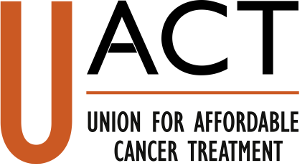Today, UACT submitted letters to the CEOs of three major pharmaceutical companies currently developing chimeric antigen receptor T-cell (CAR T) technologies. UACT asked the leaders of Novartis, Gilead Sciences, and Juno Therapeutics to address questions regarding research and development (R&D) costs, federal-funding received, potential public health impact, and ensuring equitable and affordable access to CAR T treatments in the US and around the world.
The first CAR T treatment was approved by the FDA yesterday, a treatment for leukemia in children and young adults produced by Novartis, and was quickly announced to carry a $475,000 price tag. As this new area of cancer-treating technologies emerges, it is important to examine the costs involved in producing these treatments and to push drug companies to ensure broad, affordable access to these potentially game-changing treatments. The public also has a particular interest in these treatments as much of the initial research was conducted by the NIH and with NIH funding, before the resulting patents were licensed to the pharmaceutical companies.
The text of the body of the letters follow below . Here are the links to the PDF versions of the letters sent to Novartis, Gilead and Juno.
Union for Affordable Cancer Treatment
1621 Connecticut Avenue NW
Suite 500
Washington, DC 20009
Tel.: 202.332.2670
www.uact.org
….. Separately addressed to CEOs of Novartis, Gilead and Juno
The Union for Affordable Cancer Treatment (UACT), created in 2014, is a union of people affected by cancer, their family members and friends, people who take care of people with cancer, health care professionals and cancer researchers committed to increasing access to effective cancer treatment and care. We are particularly concerned about the rapidly escalating cost of cancer medication and seek to fight for cancer treatment and care to be affordable and available, everywhere, for everyone who needs it.
We are writing to ask questions about the company’s costs of developing chimeric antigen receptor T-cell (CAR T) treatments for cancer, the number of people you anticipate will benefit from this treatment, and the steps that each company will take to ensure equitable and affordable access. The questions are as follows:
What are the specific costs that your company has incurred or you anticipate will incur to bring a CAR T treatment to market, including, in particular, the actual research and development costs, as opposed to and distinct from the costs of acquiring a company that holds CAR T patents?
What is the expected manufacturing and delivery cost of a CAR T treatment, including specifically the costs your company will incur to provide the treatment to a patient? In estimating the manufacturing costs, we ask that you identify the components of costs that are related to infrastructure that can have dual uses, or can be reused for other projects.
What will be the expected costs to the patient incurred by related health care providers, such as the entities receiving and injecting cells into the patient, and monitoring and caring for the patient during and after delivery of the cells?
Which patents and patent applications are currently held by and/or licensed to the company for CAR T, and in which countries are these patents filed or expected to be filed?
For the patents listed in question 4, which patents have rights by the United States or any other government?
Which grants, research contracts, CRADAs, tax credits and other subsidies from governments and nonprofit entities were relevant to the development of the CAR T treatment?
How many patients will potentially benefit from CAR T treatment in the United States, in other high income countries, and in developing countries?
What steps will your company take to ensure equitable and affordable access to CAR T treatments in the United States, in other high income countries, and in developing countries?
Will your company enter into negotiations with the Medicines Patent Pool to license CAR T technologies in developing countries?
We look forward to receiving your responses. Thank you.
Sincerely,
Manon Ress, Acting Director, UACT
manon.ress[at]cancerunion.org
Jordan Donn Jarvis, Member, UACT Board of Directors
Ophira Ginsburg, MD, Member, UACT Expert Advisory Board
Gilberto de Lima Lopes Jr., MD, MBA, FAMS, Member, UACT Expert Advisory Board
Ruth Lopert, MD, Member, UACT Expert Advisory Board
Ilze Aiszelniece, Member, UACT Organizing Committee
